First Look: Cleveland Foundation Headquarters Officially Opens Today
by Dillon Stewart | Jul. 15, 2023 | 12:30 PM

Eric Hanson, S9 Architecture and Peio Erroteta, Kamron Khan
Click here for more information on the Cleveland Foundation's Grand Opening events on July 15.
In the early 1970s, Playhouse Square — one of Cleveland’s most vital and well-known assets — almost disappeared thanks to a city-planning trend called “urban renewal.”
Basically, the tactic, which involved razing blighted areas and starting anew, was designed to confront America’s aging cities, and in some cases, such as Atlanta’s BeltLine district, this helped lower crime and make the land cheaper to develop. In other cases, however, it led to displacement, urban sprawl and trading historic assets for the dreaded surface lot.
And had it not been for the Cleveland Foundation, Playhouse Square would have likely had that exact, unsightly fate. The organization claims to be the first to use a priority-investment loan, PRI, to purchase the two buildings housing the neighborhood’s most popular theaters and subsidize the growth of the Playhouse Square District during the next 50 years. Part of that commitment included setting up its headquarters in the Hanna Building, across the street.
“The buildings were all boarded up, all 11 theaters. Marquees were starting to come down.They were weeks away from demolition,” says Lillian Kuri, who takes over as the first female President and CEO of the Cleveland Foundation this summer. “It was as important to stop the demolition as it was to change the conversation. We would have been the city that demolished the second-largest theater district outside of New York. It would have been a tragedy.
Now, the Cleveland Foundation has its sights set on another 30- to 50-year project: helping to revitalize the near-East Side of Cleveland and connect Downtown to University Circle.
“These East Side neighborhoods have been historically redlined. They have seen very little investment; they’ve not seen the renaissance that West Side neighborhoods have,” says Kuri. “So we’re kind of planting a flag here and saying we’re going to work with the community collectively over the next 30 years to also change the conversation about how important Central and Fairfax are and how many incredible leaders and residents and institutions are already here.”
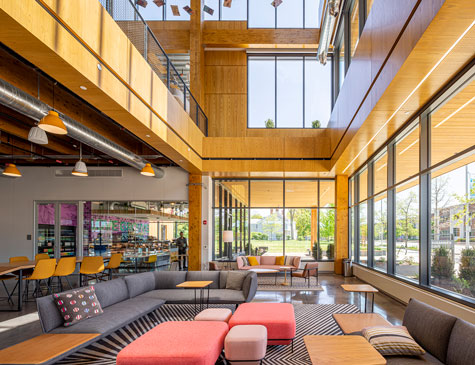
The Space: Reimagining the Way We Work
This week, on July 15, the community organization is taking a significant step in accomplishing this goal by officially opening its new headquarters on East 66th Street and Euclid Avenue. The project cost more than $20 million but, like its initial investment into Playhouse Square, was funded by a PRI, which basically means that it used its endowment to pay for it rather than asking for grant money.
The building is about 55,000 square feet. While this is nearly equivalent to the Foundation’s office in the Hanna Building, one leader of the organization had sarcastically dubbed “The Ivory Tower,” the new space dedicates only one-third of the footprint to standalone offices and gives the Foundation streetside access. The rest features meeting centers, activity rooms and open, shared workspace — all of which the organization plans to rent or loan out to businesses and charities by 2024. The Foundation is also home to two tenants: Susanna’s Cafe and Neighborhood Connection.
"We've really wanted to push the envelope of what is the future of work, and what does that feel like and how does it feel to come back to the office," says Kuri.
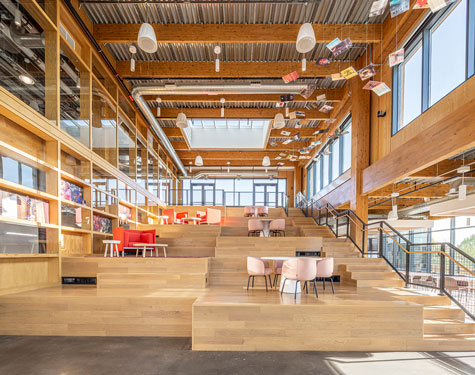
The striking, modern venue was built using mass timber, a more environmentally friendly approach that was also seen recently in the mixed-use Intro Building on West 25th Street in Ohio City. Thus, much of the building’s surfaces and facade resembles natural maple wood.
Not your average office building, the Cleveland Foundation’s new headquarters includes more than a few notable features.
The heartbeat of the building is the Rawson Community Stair, named after Barbara Hass Rawson, who served as the Cleveland Foundation’s interim CEO (putting the slightest asterisk in Kuri’s designation as the first female leader). Books that hang from the ceiling recognize former winners of the Anisfield-Wolf Book Awards, a national award by the Cleveland Foundation that honors books that have “made important contributions to our understanding of racism and our appreciation of the diversity of human cultures.” More than just a space to post up and work, the Foundation also hopes to host movies and other events there.
Many visitors might first interact with the space through Susanna’s Cafe, a coffee shop and eatery operated by HELP Harvest, which offers job training for individuals with intellectual and developmental disabilities who are hoping to enter the workforce. Other notable features include conference rooms with retractable walls, a dance/activity room with streetside access for after-hours events, a rooftop patio space, a lounge for big donors, a parking lot with a solar-powered roof and electric vehicle charging stations, and an art gallery that will rotate between various community-focused projects.
After all, the community is at the forefront of the space’s new design, the organization says.
“We’re not coming here to wipe this clean and save the day,” Kuri says. “One of our big goals was to make sure we did something that everybody would see themselves in. We're coming here to work with the community and help everybody rise up. Our measure of success is: Have we made the lives of residents in the neighborhoods directly adjacent to where we are better?”
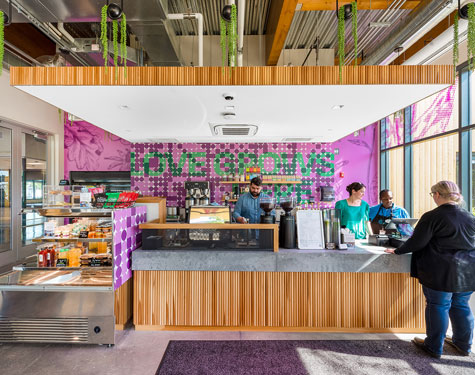
The Future: A Nightlife District
More construction by the Cleveland Foundation has already started on the lot across East 66th Street.
That building, the future home of MidTown Collaborative Center, is the next, 95,000-square-foot step in the Foundation’s plan to create a hub for the MidTown District along East 66th Street that offers a “sense of arrival,” says Kuri.
The president and CEO knows that a neighborhood can’t thrive off of workspace and industry alone. So, the plan is to create a multi-use district with apartments, a music venue, a restaurant (Pearl's Kitchen), a brewery (Black Frog Brewery, Northeast Ohio’s first black-owned brewery) and a park that winds between the Cleveland Foundation HQ and the historic Dunham’s Tavern and connects to Chateau Hough Winery.
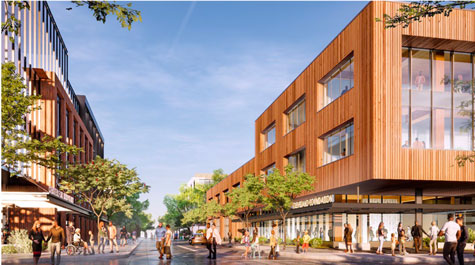
“We’ve done enough to create the sense that you would come here on a Thursday night,” says Kuri, “not just come to an institution but to do something cool and hang out and be outdoors and attract people.”
Despite its physical presence moving to MidTown, Kuri assures Cleveland Foundation observers and donors that its focus remains in every pocket of the city. She says the organization is “investing heavily” in Clark-Fulton and La Villa Hispana, a Hispanic neighborhood that is organizing efforts and launching a new community space, on the near West Side as well as Downtown.
And despite reports of lower foot traffic and crime Downtown, Kuri feels optimistic about Downtown’s future and says the charitable organization is actively investing in myriad ways.
“These kinds of major catalytic developments (Bedrock’s Riverfront project, the proposed development of the lakefront and more) are as big as when the Gateway District was built Downtown,” she says. “I think we'll know, there's a big moment for transformation and continued growth.”
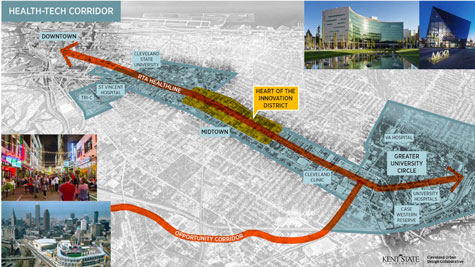
The same goes for MidTown, she says, and the new home of the Cleveland Foundation.
“The Cleveland Foundation was created at the time when there really was no mechanism for community philanthropy,” she says. “Like the Cleveland Foundation (itself), we hope this (building) can be a living organism and a platform for change.”

Dillon Stewart
Dillon Stewart is the editor of Cleveland Magazine. He studied web and magazine writing at Ohio University's E.W. Scripps School of Journalism and got his start as a Cleveland Magazine intern. His mission is to bring the storytelling, voice, beauty and quality of legacy print magazines into the digital age. He's always hungry for a great story about life in Northeast Ohio and beyond.
Trending
-
1
-
2
-
3
-
4
-
5










